The comparison between the deeds of Duvalierism and the actions of Jovenel Moïse reveals disturbing similarities
In the popular turmoil that followed the fall of dictator, Jean-Claude Duvalier, on February 7th , 1986, a slogan emerged: Haiti, never again! This cry of anger reflected a break from the 29 years of the Duvalierist dictatorship. A cruel period marked by the systematic violation of human rights, corruption, daily repression, one-track thinking and the dismantling of institutions of the country.
Thirty-five years after the departure of the Duvaliers, great concerns about the return to an era that was believed to be over are floating in the air.
The interpretations of Article 134 of the Haitian Constitution relating to the duration of the presidential mandate plunge us into a confused situation. On the other hand, certain measures taken by the administration of the Haitian Tèt Kale Party (PHTK) leave no room for doubt as to the regime’s inclinations to lead the country down the path of authoritarianism.
Most of the highlights of the current administration recall the dark times of the totalitarian regime of the Duvalier who ruled the country, from 1957 to 1986. Haitian society still retains the scars of the disastrous regime which is said to have claimed more than 30,000 victims.
A country doctor vs. the peasant owner of a large banana plantation
During the 1957 electoral campaigns, the presidential candidate François Duvalier presented himself as an ingenuous country doctor, who wanted to be the redeemer of the alleged black race. He saw himself as the Messiah of the underprivileged, the marginalized, the forgotten — even as his henchmen planted homemade bombs to fuel political tensions linked to polling.
The same rhetoric was repeated in 2015 when the Repons Peyizan become PHTK. They wanted to propel the candidate Jovenel Moïse onto the political scene. He was until then unknown to the Haitian electorate. The image of the son of a lower class, humble family, who became an entrepreneur and was presented as being the most able to relaunch national production, was set in motion by the “pink” marketing machine (PHTK).
With the support of a sliver of the Haitian bourgeoisie and certain actors of the international community, the current number 1 of Tèt Kale was elected president in 2016, in elections marred by irregularities. The election was supported by the United Nations and the Core-Group (United States, European Union, Canada, etc.). Jovenel Moïse, owner of the Agritrans (a company involved in the corruption scandal Petrocaribe according to a report by the Court of Auditors) found himself at the helm of a nation.
The political speech of François Duvalier, having black power as an ideological basis, targeted a social category, ‘’the mulattoes’’. According to Duvalier, the mulattoes were responsible for the impoverishment of the population. However, its regime’s massacres in the Southeast (Thiotte, Belle-Anse / Saltrou, Grand Gosier, Anse-à-Pitre) mainly affected the lower class, the social category that Duvalierism claims to defend.
Jovenel Moïse grants privileges and contracts to certain sectors of the bourgeoisie.
On his side, Jovenel Moïse grants privileges and contracts to certain sectors of the bourgeoisie. This is considered to be contradictory to his populist discourse “ti rès la pou pèp la”. Economist Fritz Alphonse Jean, former governor of the Haitian central bank, evokes the concept of “great replacement” to define this transfer of privileges from one sector of the economic oligarchy to another operated by the PHTK regime.
The decree recently enacted by President Moïse regarding the creation of the free agro-industrial zone of Savane Diane / Saint-Michel, in favor of the Apaid family (an influential member of the local bourgeoisie) illustrates this observation.
Forerunners
From the first five-year term of the Tèt Kale, serious threats weighed on the Haitian democracy. Between arbitrary arrests of parliamentarians in office, repression of demonstrations, corruption, repeated attacks against the press and denier discourse favorable to Duvalierism; strong signals were constantly being sent to Haitian civil society by the administration of former president Michel Joseph Martelly. His desire to sabotage the democratic gains resulting from the popular struggles of 1986 was palpable, according to the analysis of several human rights organizations.
The current authoritarian deviations are part of this same lineage.
In August 2018, the protest movement PetroChallenge, which shook the foundation of the regime, were violently repressed. In the months that followed, it was the turn of the population of Lasalin to pay the price of the repressive machine of PHTK. More than 50 citizens are assassinated during this operation which the National Network for the Defense of Human Rights (RNDDH) describes as a ‘state massacre’ in its report published in December 2018. These facts echo the Vêpres de Jérémie (Vespers of Jeremiah) in 1964 where entire families (including the elderly and children) were slaughtered by the makout (a special operations unit within the paramilitary force under Duvalier) and soldiers of the Armed Forces of Haiti (FADH).
On the vestiges of this repressive body, demobilized in 1995, Jovenel Moïse will institute his new armed force, consisting of 435 members in August 2019. Remember that a former convict, sentenced in absentia in the Raboteau massacre, is part of his senior staff.
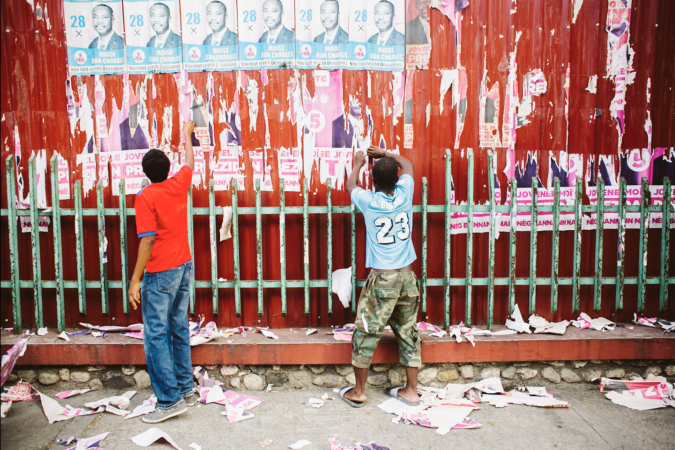
Moreover, several high status figures of the time and nostalgics for Duvalierist era are currently in Jovenel Moïse’s administration. The most emblematic figure of all of them is Louis Gonzague Edner Day, the Minister for Haitians living abroad. A notorious fan of Duvalier, he did not hide his desire to see the return of the son of the former dictator into politics in Haiti in an interview given to AyiboPost in 2018: “As a fan of Duvalier does politics on the ground, I think I owe a debt to Nicolas [Duvalier] because the Duvalier family has been so helpful to my family.”
The planned dysfunction of the Haitian Parliament
On January 13, 2020, (via a publication on his Twitter account), the tenant of the National Palace, President Moïse, claims to have noted “the lapse of parliament”. No emphasis has been placed on the fact that legislative elections have not taken place to prevent this institutional vacuum. On the contrary, this dysfunction of the parliament will clear the way for the de facto government of President Moïse and Joseph Jouthe which, from January to December 2020, will adopt 38 decrees, each more controversial than the last.
The current administration is not the only one to have issued decrees since the 1987 Constitution. However, lawyers denounced the extent of the decisions taken and the obvious illegality of certain decrees (the organization of a referendum prohibited by the constitution). Even the Core-Group, a loyal ally of the PHTK regime, has stepped up to the plate to castigate decrees deemed not to be in “compliance with certain fundamental principles of democracy, the rule of law and the civil and political rights of citizens ”.
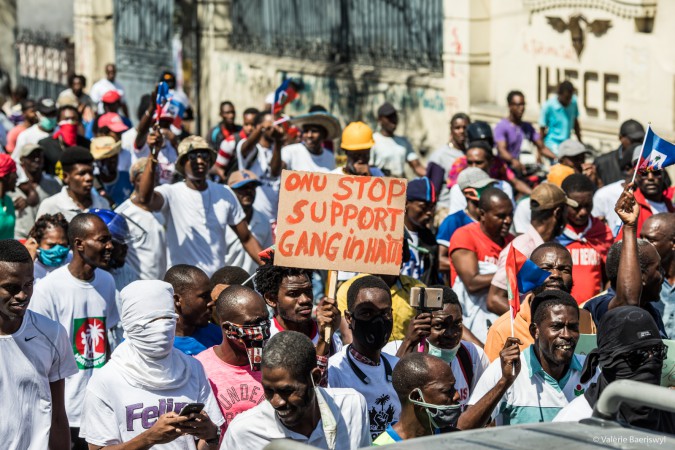
Several thousand people demonstrated on Sunday, February 14, 2021, in Port-au-Prince to denounce the desire, according to them, of the government in power to re-establish a dictatorship in the country, also criticizing the support of the international community for President Jovenel Moïse. (c) Valerie Baeriswyl
In December 2020, the human rights organization Fondasyon Je Klere (FJKL) sounded the alarm bells in the face of the actions of President Moïse which resemble those of François Duvalier during his reign. Note that the former president Duvalier published 142 decrees relating in particular “ to the Criminal Code, to the reorganization of the Armed Forces “ within six months, that is from July 1958 to January 1959.
The dismantling of institutions like parliament and the Court of Cassation was also part of Duvalier’s political agenda. To accommodate a new six-year term (that would later turn into a life presidency), the dictator dissolved the parliament. Three years later, he dismissed the president of the Court of Cassation.
In 2020, more than 50 years later, history is repeating itself. Like his predecessor, President Moïse attacks institutions of checks and balances. His refusal to organize the legislative elections during his mandate caused the dysfunction of the parliament.
Then, he attacked the Court of Cassation by terminating the mandate of three judges in violation of Haitian law.
Two different eras and two heads of state, yet the attacks on democratic institutions are similar. The result is nothing but a shift towards authoritarianism.
The establishment of a repressive system
Two of the decrees promulgated by the Moïse-Jouthe administration concern public security and the creation of the National Intelligence Agency (ANI). ANI members exercise extrajudicial power. “No ordinary or extraordinary recourse before the courts to prevent the functioning and activities of the agency” is admissible, we read in the decree.
The three main officials (director general, inspector general of intelligence services, director of the intelligence academy) are appointed by the president to whom a daily report must be submitted on ‘‘national security and the protection of the fundamental interests of the Nation’’ .
The agency whose members can acquire firearms has a plan for ‘‘VIGICITOYEN’’; which is a graduated scale for assessing the risks and threats faced by the Nation.
Even observers who admit the need for a secret service denounce the exorbitant powers granted to the ANI.
Even observers who admit the need for a secret service denounce the exorbitant powers granted to the ANI. This structure does not require the recourse of an impartial judge to put under observation, and search a citizens’ homes. In other countries, safeguards are introduced to ensure that there is no violation of individual freedoms. In Haiti, the agency makes its disciplinary decisions internally and its all-powerful agents operate in complete secrecy.
The creation of this agency recalls the introduction of the National Security Volunteers (VSN) in July 1958. These famous Tonton makout linked directly to former President François Duvalier had the right to life and death over anyone. This paramilitary body “Has only one soul: Duvalier, knows only one leader: Duvalier, only fights for one fate: Duvalier in power” , to quote the dictator (Laënnec Hurbon).
The ANI recalls the introduction of the National Security Volunteers (VSN) in July 1958.
Alongside the ANI, there is also the Protected Areas Surveillance Brigade (BSAP). This body intended to preserve green spaces following a decree dating from January 2006 has granted itself a new mission in violation of Haitian law.
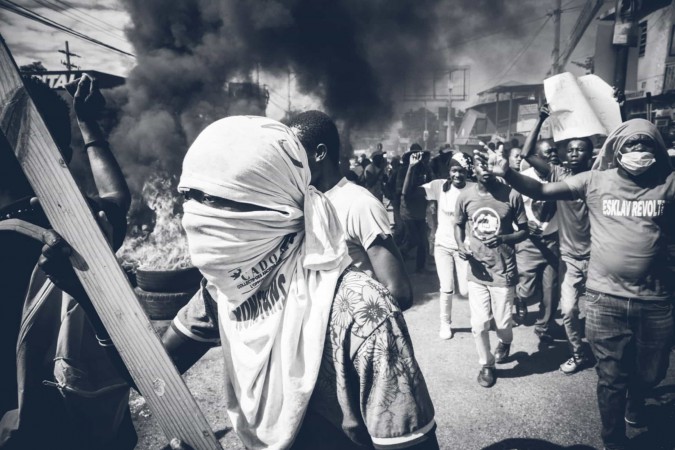
Recently, an individual named Jean Baptiste Joseph, wearing an olive green uniform and sunglasses, responsible for BSAP in the Center department, made threats against those whom he believed served as an obstacle to the development of the country. “From now on, we will arrest no matter the sector which wants to stage a coup, as well as all people who want to hinder the country’s progress… ” he declared to the press.
Other heavily armed BSAP agents already have a long list of abuses to their credit.
Alongside these two institutions which incorporate what civil society institutions call the repressive system of the PHTK regime, it is important to also point out the contribution of the G9 (which is a confederation of the most powerful gangs in the metropolitan region). According to the various reports of human rights organizations, the G9 which participated in the massacre of Lasalin in November 2018, maintains close relations with the Jovenel-Jouthe administration. This grouping of gangs (the main guaranteers of the victory of the PHTK party in the next electoral contests according to Fondasyon Je klere), was created under the auspices of the National Commission for Disarmament, Dismantling and Reintegration, confessed Jean Rebel Dorcenat, one of the officials of the CNDDR.
If Duvalier had at his disposal the makout, the FADH and the VSN to suppress any form of protest against his regime; Nowadays, the neo-Duvalierists embodied by the PHTK (Laënnec Hurbon) can be proud of having the G9, the ANI, the BSAP and the PNH headed by Léon Charles.
Referendum, new constitution: a sense of déjà vu?
The 1987 Constitution (the only one resulting from a popular referendum in the country’s history) has always been a favorable target for administrations Repons Peyizan / PHTK. From presidents Michel Martelly to Jovenel Moïse, attacks have always been directed against the democratic gains resulting from the popular struggles of 1986. So, it is no wonder that the current number 1 in PHTK wants to impose (in the absence of parliament) a new constitution.
However, it is important to note that the administration of former president, René Préval, amended the Constitution during his second term. This amendment is considered by some to be a source of political instability. However, the actions of the current government to impose a new constitution, in violation of the mother law and in the absence of the parliamentary institution are puzzling.
In 1961, with two years remaining in power, Duvalier granted himself a new six-year mandate during the legislative elections. Three years later, he promulgated a new constitution which granted him the presidency for life in its Articles 100 and 101. Long before his death in 1971, with the backing of US Ambassador, Clinton Knox, he appointed his then nineteen-year-old son, Jean-Claude Duvalier, as his successor to the position of president for life.
To achieve this, Duvalier first carried out a “constitutional amendment which lowers the age required for the office of President of the Republic from 40 to 19 years of age”. The ensuing national referendum yielded 2,391,917 “yes” votes, with one no and two blank votes. It must be said that the “yes” option was printed in advance on all the ballots, reports the New Zealand journalist, Bernard Diederich.
On Thursday 11th of February 2021, the Minister delegate to the Prime Minister, Mathias Pierre, distributed copies of the new constitution of the PHTK regime. Previously, in January 2019, during a social evening hosted by the group Sweet Micky of the former President Martelly, the former Prime Minister, Guy Lafontant, declared “this year is a year of struggle, and the bitter struggle will be 2021, because we have to keep political power for 30 years, 50 years”. Adding to this are recent statements by Jovenel Moïse “After God, I am the man who has the most power in the country ”, or “No one will ever be able to take this power from me again, whatever the election” .
Between referendum, elections, new constitution and political repression in order to ensure the sustainability of the power in place, there is certainly a case to say that the PHTK regime has similarities with that of François Duvalier, who led the country with an iron fist for 29 years.
The political crisis that Haitian society is currently experiencing, where the presidency is the only institution to stand up in the absence of checks and balances, constitutes a real threat to Haitian democracy. Thirty-five years after the fall of the Duvaliers, have we gone back? Has the “Time to talk to each other by signs” come? to paraphrase the poet Anthony Phelps, author of the collection of poetry « My country that is here » whose writing began in Haiti, more than 50 years ago, during the dark first years of the Duvalier dictatorship.
Feguenson Hermogene

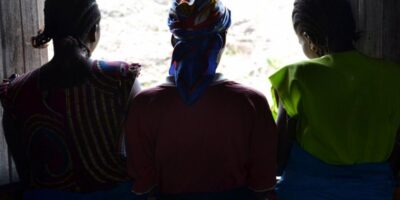


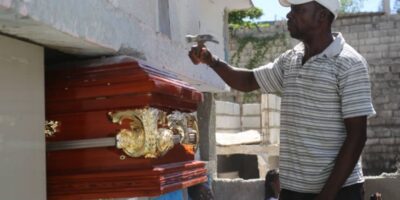


Comments